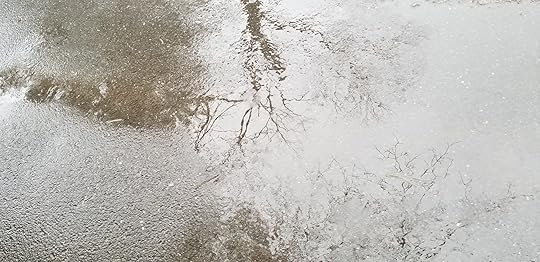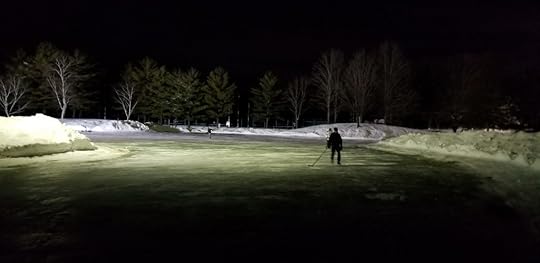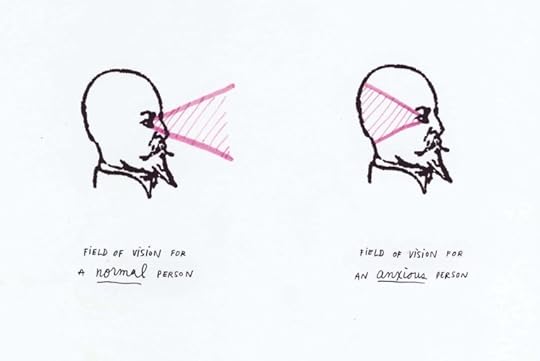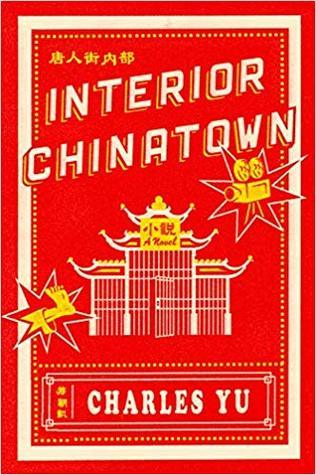David Klein's Blog, page 54
February 16, 2021
The Black Chemistry



One of those goddamn depth-of-winter days when the snow is sooty, the sky relentless gray, the trees dismal brown. You force yourself out for a run and make it as far as the cemetery but sure enough your foot aches, you step in a deep cold puddle, and you’re going to die someday.
This chaotic black chemistry that is you.
Then the freezing rain starts like someone mocking me.
I lower my gaze and—look at that—the bare trees reflect in the puddle and the raindrops dream up perfect round eddies like notes from a song.
And just this, this slight change of angle, shatters my gloom. I go a little faster and lift my face to the icy stings, and imagine that, I can still feel, I can still run, the sun won’t come out but I’m not dead yet.
Read this with Skating on a Winter Night, my just conceived series of winter poems.
The post The Black Chemistry appeared first on by David Klein.
February 14, 2021
Ode to Valentine’s Day
We didn’t exchange cards this year. We didn’t even send Valentine’s to the kids, who are now young adults. It’s not that we’re not filled with love—we are. But a manufactured day of love doesn’t move the needle for me.

I’m not sure when I first started eschewing this holiday. Certainly not when I was a kid, when my mom would overdose us with candy conversation hearts, cinnamon red hot hearts, and chocolate hearts. And Valentine’s Day was special the first time I had a girlfriend and I was bursting with romantic love.
Maybe my attitude adjustment started during my years working in the restaurant industry. Valentine’s Day was one of the few days every year when every table was booked (the other two days were New Year’s Eve and Mother’s Day).
The problem from the insider’s point of view was that every table was a deuce. You’d have to sit two people at a table that that can accommodate four or even six diners. You didn’t get the big parties coming in that would spend a lot of money.
Sure, every year there would be that one couple that got engaged in the restaurant on Valentine’s Day. Sometimes this would involve the staff: the ring brought out on the dessert plate, or sunk to the bottom of a champagne glass. Such a sweet, public gesture, but could you hurry up because we’re behind and people are waiting for your table.
I don’t mean to be cynical about Valentine’s Day. It’s a great day to be in and express love. But what if you’re alone and lonely? I did a quick search of “Valentine’s Day and loneliness” and came across an almost surreal collection of articles and advice:
“Five Ways to Feel Better if You’re Solo on Valentine’s Day.”
Twice as good as that article is this one: “Ten Best Ways to Feel Better if You’re Lonely on Valentine’s Day.”
The first of those ten best ways: “Ignore Valentine’s Day.” Thanks. That’s helpful. I’ll just pirhouette away from my pain.
Good old WikiHow offers nine ways to be happy being single on Valentine’s Day. Method #3: Be happy with yourself regardless of your relationship status. That’s another great tip. It reminds me of the old joke about how to retire happily with five million dollars. Step 1: Make five million dollars.
The most bizarre tip I came across for combatting loneliness on Valentine’s Day is this:
“Spend two minutes and look at yourself. Make really good eye contact so you’re connecting to yourself. What you want to do is look beyond the physical. You’re looking beyond all the things we generally look at and you’re simply maintaining eye contact with yourself. This is a profound way to get to know yourself better and to become more at ease and comfortable with yourself. It’s amazingly powerful. When you do this with yourself it has the ability to make you more at ease with others.”
Wow, talk about benefits. I immediately gave the two-minute drill a try. The mirror told its tale: I need a haircut. I need a shave. My lips are chapped. My eyes are blue, but my lids are drooping and my bags are full. All is in order.
I can’t say I got to know myself better, but it was an interesting two minutes, which might have been better spent telling the people I love that I love them. I think I’ll do that now. And also run out for a bag of candy hearts. And cook something nice for dinner. And listen to Chet Baker’s soothing voice and sublime trumpet in his version of “My Funny Valentine”
The post Ode to Valentine’s Day appeared first on by David Klein.
Ode to Valentine’S Day
We didn’t exchange cards this year. We didn’t even send Valentine’s to the kids, who are now young adults. It’s not that we’re not filled with love—we are. But a manufactured day of love doesn’t move the needle for me.

I’m not sure when I first started eschewing this holiday. Certainly not when I was a kid, when my mom would overdose us with candy conversation hearts, cinnamon red hot hearts, and chocolate hearts. And Valentine’s Day was special the first time I had a girlfriend and I was bursting with romantic love.
Maybe my attitude adjustment started during my years working in the restaurant industry. Valentine’s Day was one of the few days every year when every table was booked (the other two days were New Year’s Eve and Mother’s Day).
The problem from the insider’s point of view was that every table was a deuce. You’d have to sit two people at a table that that can accommodate four or even six diners. You didn’t get the big parties coming in that would spend a lot of money.
Sure, every year there would be that one couple that got engaged in the restaurant on Valentine’s Day. Sometimes this would involve the staff: the ring brought out on the dessert plate, or sunk to the bottom of a champagne glass. Such a sweet, public gesture, but could you hurry up because we’re behind and people are waiting for your table.
I don’t mean to be cynical about Valentine’s Day. It’s a great day to be in and express love. But what if you’re alone and lonely? I did a quick search of “Valentine’s Day and loneliness” and came across an almost surreal collection of articles and advice:
“Five Ways to Feel Better if You’re Solo on Valentine’s Day.”
Twice as good as that article is this one: “Ten Best Ways to Feel Better if You’re Lonely on Valentine’s Day.”
The first of those ten best ways: “Ignore Valentine’s Day.” Thanks. That’s helpful. I’ll just pirhouette away from my pain.
Good old WikiHow offers nine ways to be happy being single on Valentine’s Day. Method #3: Be happy with yourself regardless of your relationship status. That’s another great tip. It reminds me of the old joke about how to retire happily with five million dollars. Step 1: Make five million dollars.
The most bizarre tip I came across for combatting loneliness on Valentine’s Day is this:
“Spend two minutes and look at yourself. Make really good eye contact so you’re connecting to yourself. What you want to do is look beyond the physical. You’re looking beyond all the things we generally look at and you’re simply maintaining eye contact with yourself. This is a profound way to get to know yourself better and to become more at ease and comfortable with yourself. It’s amazingly powerful. When you do this with yourself it has the ability to make you more at ease with others.”
Wow, talk about benefits. I immediately gave the two-minute drill a try. The mirror told its tale: I need a haircut. I need a shave. My lips are chapped. My eyes are blue, but my lids are drooping and my bags are full. All is in order.
I can’t say I got to know myself better, but it was an interesting two minutes, which might have been better spent telling the people I love that I love them. I think I’ll do that now. And also run out for a bag of candy hearts. And cook something nice for dinner. And listen to Chet Baker’s soothing voice and sublime trumpet in his version of “My Funny Valentine”
The post Ode to Valentine’S Day appeared first on by David Klein.
February 12, 2021
Updated Vaccine Priority List
 Illustration by Peter Hamlin
Illustration by Peter HamlinYou can only get the shot if you are designated 1A.
You can get the shot if you are a health care worker.
You can get the shot if you fly an airplane.
You can get the shot if you live/work in a nursing home.
You can get the shot if you work in a restaurant.
If you are clever and devious enough to cut the line.
You can get the shot if you are tech-savvy and can navigate the confusing options and contradictory websites in order to score an appointment time.
Are you are old enough?
You can only get the shot if you are 1B.
You can get the shot if you are willing and able to travel for hours to a location where shots are being given.
You can get the shot if you have diabetes.
You can get the shot if you have a heart condition.
Only get the shot if you believe the shot is worth getting.
You can get the shot if you wait your turn.
You can get the shot if you have liver disease.
Corrections officers and law enforcement step this way, please.
First responders, appointments are available.
You can get the shot if you are a teacher.
You can get the shot if you are homeless or work in a homeless shelter.
Pulmonary disease. Kidney disease.
Neurologic conditions.
Give me your tired, your poor, your huddled masses yearning to breathe free.
You can get the shot if you are a transit worker.
Shots are available if you work in a public-facing profession.
You can only get the shot if we get more shots to give.
You can only get the shot if only there is a viable plan to give the shots.
You can only get the shot if you know you can get the shot.
You can get the shot if you want one.
You can get the shot.
The post Updated Vaccine Priority List appeared first on by David Klein.
February 9, 2021
“I Was Allowed to Believe . . .”

Sadly, U.S. Representative Marjorie Taylor Greene was not a student in one of my writing classes. If she had been, she never would have come up with this statement constructed in the passive voice:
“I was allowed to believe things that weren’t true.”
MTG
A general rule in writing is to choose the active voice over the passive voice.
Here’s the difference between them:
If MTG had been using the active voice, she would have written, “I believed things that weren’t true.” In the active voice, the subject of the sentence, “I”, engages in the action, “believed.” It’s a simple, declarative, clear way to write.
By contrast, in the passive voice, the subject of the sentence doesn’t act, but instead is acted upon. “I” “was allowed to believe.”
What’s not clear in this muddled, passive construction is who or what acted upon the subject “I.” Who allowed this belief to happen in MTG? Was it God? Was it conspiracy theorists? Was it her parents or friends? Was it a former president?
When writing in the passive voice, you end up with weak sentences that obscure meaning and deflect agency.
The other part of MTG’s sentence that I would request a student to edit is the word “things.”
“Things” is a noun. We all know the word. But it’s an abstract word and it can refer to any number of objects, facts, events, circumstances, and more.
Another helpful guideline to make your writing stronger is to choose concrete language over abstract language. Concrete language is specific and particular. Abstract language is general and vague. For example, instead of using the word “things” MTG might have written: “forest fires caused by Jewish space lasers, school shootings staged by the anti-gun lobby, the hoax that was 9-11, and a Democratic cannibalistic, pedophiliac cabal.”
See? That’s specific. It’s the difference between abstract and concrete language.
So if we make a few adjustments to make MTG’s sentence stronger and clearer, it might read:
“I believed that wildfires were caused by a Jewish space laser, the Sandy Hook and Parkland school shootings were staged by the anti-gun lobby, 9-11 was a hoax, and the Democrats are really a cannibalistic cabal of pedophiles.”
I know that’s what MTG had meant to say. Oh, if only Marjorie had put down her guns long enough to attend one of my writing classes. But, as they say, passively, “Mistakes were made.”
The post “I Was Allowed to Believe . . .” appeared first on by David Klein.
February 8, 2021
“Passing” as a Different Person
I recently read The Vanishing Half (review here), about a young, light-skinned Black woman who makes the life-altering decision to pass as white, and the anxiety and stress that dog her life from that point on while trying to protect her secret.
The novel, written by a young Black author, Britt Bennett, is currently a New York Times bestseller. After reading The Vanishing Half, I turned to another novel with a storyline about a Black man who passed as white, The Human Stain, by Philip Roth, a white man. I first read the novel when it was published in 2000, and last week I read it again.

In The Human Stain, Coleman Silk, who has been passing as white since his early twenties and is now 71 and a distinguished professor at a small New England college, is harassed into resigning his position because he said something that was perceived as a racist slur.
The Human Stain was the third of a loose trilogy written by Roth about America in the second half of the twentieth century (American Pastoral, I Married A Communist). It was also a national bestseller and won a number of literary awards.
I wonder if that novel, written by a white man about a Black character, would be published today due to the pressure and momentum to publish “#ownvoices”. I understand the need to give voice and exposure to the underrepresented and marginalized. But as an author whose major skills are imagination, research, and endurance, I’m of the mind I can write anything I want, about any kind of character, in any kind of situation. If the result reads as authentic, I’ve achieved my goal. The ultimate arbiter, of course, is the market.
Regardless of who wrote these two novels, both of them are exceptional. The concept from these books that lingers with me—gnaws at me, makes me want to explore further—is the idea of “passing.”
Passing is the ability to be accepted, wrongly, as being a certain type of person, or having a specific identity, or belonging to a particular group. Passing is, in its essence, a big lie.
Harboring a secret as profound as your racial identity forces extremely painful decisions. In both novels, the characters must abandon their birth families in order to propagate their lies. They both marry white partners and then suffer while waiting to discover if their children will look Black. They both must live their lives basically on the run from themselves. This is the stuff of great fiction.
What great fiction also does is inspire you to reflect upon yourself. These novels make me think about how we all engage in passing, mostly in small ways, but sometimes in significant ways.
I’ve passed as someone with experience in order to get hired for a job. I’ve passed as knowledgeable about things I’ve known little about. I’ve passed as older when I was younger and trying to get into bars. I’ve passed as courageous while inside I was fearful. I’ve passed as kind and generous at times I felt mean and miserly. I’ve passed as calm when I’ve felt chaotic. I’ve passed as someone who wasn’t heartbroken. I’ve passed as someone who cares. I’ve passed as someone who doesn’t care.
Have I passed in so many tiny ways that all this passing is actually who I am? A compilation of feints and fakes conceived and executed in order to protect or project myself? I don’t think I can answer those questions here.
From The Human Stain:
. . . we leave a stain, we leave a trail, we leave our imprint. Impurity, cruelty, abuse, error, excrement, semen–there’s no other way to be here. Nothing to do with disobedience. Nothing to do with grace or salvation or redemption. It’s in everyone. Indwelling. Inherent. Defining. The stain that is there before its mark. Without the sign it is there. The stain so intrinsic it doesn’t require a mark.
Philip Roth, “The Human Stain”
The post “Passing” as a Different Person appeared first on by David Klein.
February 4, 2021
Skating on a Winter Night

To feel young again on a chilled winter night
skating on a frozen pond across the choppy ice
To feel young chasing a puck and slapping your stick
calling for a pass or attempting one
More than scoring a goal your goal is to remain upright
and not smack your brittle bones on ice as hard as concrete
To feel the freeze in your fingertips and the run in your nose
To hear your skate blades carving curls into the ice
and the shouts and calls for the puck
To drift away from the game and glide into a dark corner
of the pond where the ice is smoother
and to practice tight turns and backward crossovers
and stops and starts
To coax the moves from memory muscle
To so long ago
So long that youth
To have it again and with friends you haven’t seen
and the son you once taught to skate and who now schools you
outdoors in this moment on a winter night
under a black sky and nothing else
matters or possibly could
Until the morning after
when any movement
results in a grunt or groan
because of youth
gone so long
To catch that glimpse
to a moment you were young
The post Skating on a Winter Night appeared first on by David Klein.
February 1, 2021
My Two Favorite Blogs
This blog post is about blogs, so it’s a meta post. I have two favorite blogs that I regularly read. One is published daily, while the other comes to my inbox twice a week.
I know and love some people who are having a hard time right now. Two of the biggest reasons are a feeling of isolation and loneliness due to the pandemic, and anxiety and distress over the fraught political situation and cultural divisions in our country.
These blogs aren’t elixirs for all that might ail you. But they’ve been a positive resource for me and so I’m sharing them in case anyone out there might need more inspiration or knowledge than you can get from reading my blog (ha!).
Brain PickingsBrain Pickings is Maria Popova’s one-person “labor of love exploring what it means to live a decent, substantive, rewarding life.”
Her blog and twice-weekly newsletter focus on philosophy, literature, and art—and contain some of the most profound and substantial ideas I’ve ever come across. Her writing makes me think in new ways, see from fresh perspectives, and appreciate the complex conundrum of being alive.
Popova’s content is free. There are no ads on the website or in the newsletters. Donations accepted.
Here’s are just a few snippets from her blog:
A Stoic’s Key to Peace of Mind: Seneca on the Antidote to Anxiety.
That specific post contains this image by Catherine Lepange, which explains a lot with just a few simple lines:

Also on Brain Pickings, this sweet and touching short film (just 3 minutes) about what it takes to “recover the light of being.” You might think it has to do with houseplants, but that wouldn’t be entirely accurate. (Side note: I have 21 houseplants that I’m currently responsible for, some thriving, some struggling—all of them appreciated. If you are in need of a plant, let me know. I’ve got one for you.)
Heather Cox RichardsonHeather Cox Richardson is a historian and professor who writes a daily newsletter/blog called “Letters from an American.” Her newsletter sums up and provides historical context for the daily dose of insane news crossing our transoms each day.
I first discovered Richardson a couple of months before the 2020 election. Because of her, I was able to escape the flood of stressful rhetoric, lies, and outrage that was drowning me every day, and instead at least be able to tread water by focusing on facts and historical significance.
Yes, her newsletter expresses a point of view. Its first line today was “The most prominent story these days is that the Republican Party is sliding toward a full-on embrace of authoritarianism.” But her newsletter always includes sources and notes—it’s not just made up shit shouted through a megaphone.
You can read samples and subscribe here.
If you have favorite blogs or newsletters you’d like to recommend, please let me know.
The post My Two Favorite Blogs appeared first on by David Klein.
January 29, 2021
INTERIOR CHINATOWN — Charles Yu

The narrative structure and storytelling of Charles Wu’s quick-read “Interior Chinatown” are like no other novel I’ve read—and I’ve read a lot of them. It’s part screenplay for a cop show—Black and White—being filmed at the Golden Palace restaurant, and part interior monologue of the protagonist Willis Wu, who plays Generic Asian Man/Dead Asian Man/Background Oriental in the margins of the show, but craves the more coveted and visible role of Kung Fu Guy.
Willis lives upstairs from the restaurant/set with his parents, and he may in fact work in the restaurant. It’s never made clear if he is an actor or an employee or both, but either way, he is definitely struggling with racism and stereotypical views of Asians in the United States.
Despite our country’s history of marginalizing, discriminating against, legislating against, and violating the rights of Asians—with a number of laws and court cases brought to the forefront in the narrative—a single line in the book basically sums up Willis’ situation and state of being:
“. . . you somehow feel that your oppression, because it does not include the original American sin—of slavery—that it will never add up to something equivalent . . . Your oppression is second class.”
The story of Willis, his parents, and his own brief marriage and ensuing fatherhood is amusing and despairing at the same time.
To get such a serious message across, while writing a darkly funny and highly entertaining novel, requires the skill of a very talented and original writer: meet Charles Yu.
4/5 Stars
The post INTERIOR CHINATOWN — Charles Yu appeared first on by David Klein.
January 27, 2021
Ask Dave: Vol. 7, Number 34
Sometimes I’ll reproduce here an interesting letter that I get at my other site, an advice column that I write. Here’s one that came in recently.
Dear Dave:
I’ve been trying to stay clean because when I don’t, things tend to happen. For example, last night when I felt the desire to use I went out for a walk. I’ve been told this is a self-care strategy that can tamp down the urge. It was a cold night. I wore a coat and gloves and hat, but I hadn’t realized just how freezing the night was. It was late, and the wind was up. Within a minute of stepping out, my face was stinging and my nose running. I walked as fast as I could just to keep from freezing to death. I tried to think calming, meditative, positive thoughts. It was hard to do when shivering, but in reality, that bone-chilling cold was bone-crushing loneliness. My eyes got teary in the wind but I kept walking and made some turns and wasn’t sure where I was but soon recognized the neighborhood. The old neighborhood. There was this bar on the next block I once frequented and I went in and got a drink. I know I shouldn’t have. But inside was so warm and welcoming. I saw a guy that works there, a cook I kind of knew from before, let’s call him “Gus”, and we went back in the kitchen next to the cooler and did some lines and I bought some more from him. I started feeling a lot better. The music was perfect and people were laughing and drinking and having a good time. I had a few more drinks. I struck up a conversation with this woman, let’s call her “Sophie”, and we hit it off. She was so pretty and friendly and interested. All that lonely stuff from before just vanished. We had drinks and I told her I had coke and she invited me back to her place where she said she had pills. We each took two. We did the rest of the coke and had fantastic sex, and then a bath together, and even though I was having a great time I felt bad inside. I’ve been having this problem for years and it’s cost me. My fiancé left me and says she won’t take me back until I’m 100 percent sober. I used to have a career where I made bank and now I can’t even tell you what job I’m doing just to get by. And then I throw everything I make on a bender like last night. That’s why I’d meant to stay home and do nothing, maybe watch some TV or read a book. But I got so antsy. I couldn’t calm down. I was desperate. And lonely. Like I said, it was crushing. That’s how I ended up going for a walk and before I knew it I found myself drinking, popping pills, and snorting coke with Sophie. She was so much fun. She had this candle next to her bedside and at one point it tipped over and almost started the sheets on fire. I slapped the flames out with my hands and now I’ve got blister burns on my fingers. I’m in a lot of pain and am really at a loss about what to do. How do I keep this from happening again?
–I messed up again
Dear Messed Up:
Yes, we all make mistakes but we can learn and do better. I suggest next time you make sure the candle is a safe distance away from the bed.
The post Ask Dave: Vol. 7, Number 34 appeared first on by David Klein.



